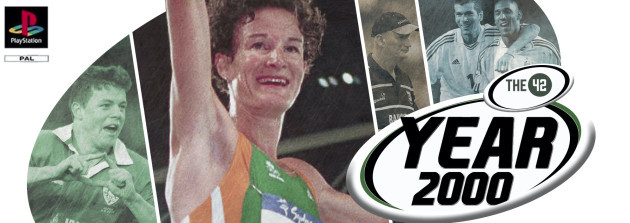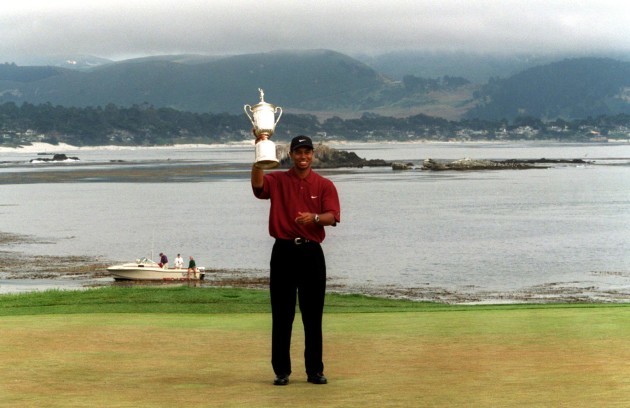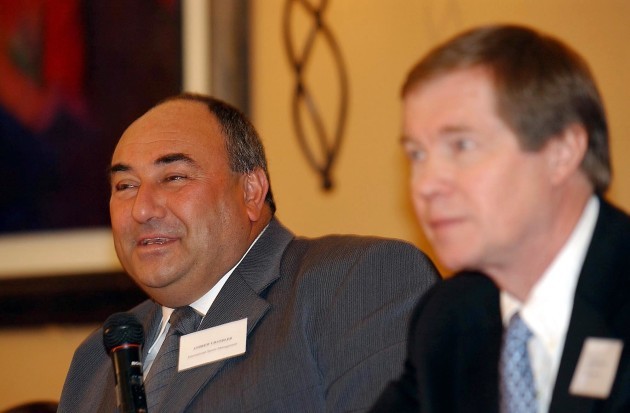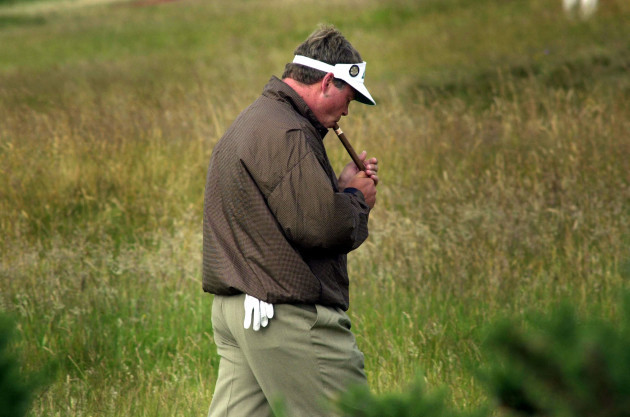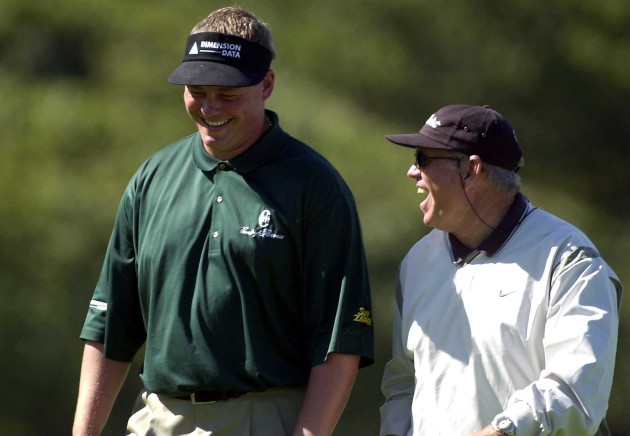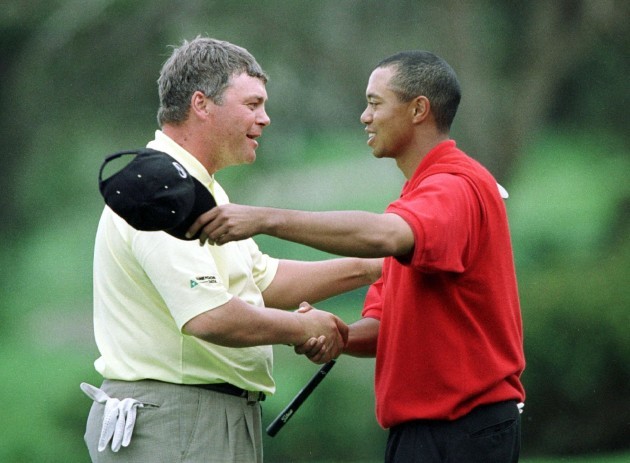This article is a part of 2000: Revisited, a week-long series of features looking back on some of the headlines and the forgotten stories that filled the sports pages 20 years ago.
Next up: Gavin Cooney recalls how Darren Clarke faced down Tiger Woods at his peak to usher in a brave new era for Irish golf…
AT THE TURN of the century, Tiger Woods wasn’t beating golf so much as mortifying it.
He won the ’99 PGA Championship, followed it with six-straight tournament wins either side of the New Year, and then won the 2000 US Open by a record 15 shots. Shaquille O’Neal and Kobe Bryant led the LA Lakers to an NBA Championship the same week…Tiger got the cover of Sports Illustrated.
Then he won the Open with a record score of 19 under par, and tagged on another PGA Championship for good measure. By the following April, he was slipping his arms through another green jacket to hold all four majors at the same time.
By the time he finished first at the Canadian Open toward the end of 2000, Woods had won 16 of his previous 27 tournaments.
All previous sporting hot streaks suddenly felt lukewarm, but if this was Tiger’s hot hand, it had a vice-like grip and was fed by iced veins.
His biographers Jeff Benedict and Armen Keteyian tell a story from the tee of the final hole of that Canadian Open win.
There was total silence as he began his backswing. Then, right in the middle of his downswing, a fan shouted, ‘Tiger!’ In that instant, Tiger brought his 125 mile-an-hour swing to a screeching halt, freezing his driver inches before the ball. No one else in the world could stop his driver so close to the ball. His mental control over his physical abilities was unparalleled.”
Woods wasn’t just playing golf; he was playing golf on his own terms.
“He is something supernatural”, shrugged Tom Watson.
“We’ll maybe have to make the holes bigger for us and a little smaller for him”, sighed Ernie Els.
**********
Darren Clarke? Not so much.
He arrived at La Costa, California for the WGC-Andersen Consulting Match Play Championship in February 2000 ahead of schedule – he was meant to be playing at Riveria but missed the cut.
He went early to get some practice in, but even that went badly, losing 6&5 in a round of match play with his manager Andrew ‘Chubby’ Chandler.
Clarke shared neither Woods’ form nor record, but he did share his coach. 10 months earlier, having missed the cut at Augusta and the Players Championship, Clarke didn’t know where to turn, so Chandler pointed in the direction of Butch Harmon.
There were early results: Clarke inched his way into the world’s top 20 with a victory at the English Open at St. Mellion and played a part in winning three points for Europe at the ’99 Ryder Cup.
Still, Clarke arrived at La Costa out of form and without a tournament win in the United States. The bookies rated Clarke at 66/1, and if he didn’t sound like a potential winner, he didn’t look like one, either.
**********
Chandler could measure out the Americans at La Costa in silver trays.
Golfers at the resort generally stayed on site, and Chandler found the Americans generally used room service for dinner. The Europeans, by contrast, would venture out.
Clarke wasn’t one to hole himself up in his room.
He, Chandler, and caddie Billy Foster struck an evening routine: they would have dinner, two glasses of red wine and Clarke would puff on a cigar before they went to bed. “You have a lot of time to kill when you’re on tour, so you almost wanted to make your dinner last four hours”, says Chandler.
Clarke worked hard at his golf game, but he didn’t sacrifice all of life’s luxuries. His talent earned him a golf scholarship at Wake Forest in North Carolina, but it ended early when coach Jesse Haddock refused to pick him. “Apparently, he wasn’t used to scholars who drank and smoked”, wrote Clarke in his autobiography.
Harmon recognised Clarke’s talent, too, but wanted him to lose 20 pounds.
Clarke’s weight became a frequent if now-jarring theme at La Costa as the week went by, although that’s partly a result of Clarke giving everyone a reason to write about him.
He kicked off the tournament on Wednesday with a 2&1 win over Paul Azinger, which was followed the following day by a second-round, 5&4 hammering of Mark O’Meara. Clarke then beat Thomas Bjorn by one in the third round to set up a fourth-round clash with Hal Sutton, then in the world’s top five.
Clarke beat him by one, albeit with a slice of fortune.
“He went out against Sutton and lost three of the first four holes, and in 18-hole matchplay that’s a big start to give”, remembers Chandler.
“The fifth at La Costa was a par-four and it had overhead electric wires running across the fairway. If you hit these wires it was a compulsory retake. He hit these wires as the ball was going 50 yards right, and he had to re tee it. If that ball hadn’t hit the wire, he’d have been in the shit and he’d have lost.
“He re-teed, hit it down the fairway, then to 10 feet, and won the hole. From then on against Sutton he was six-under across the next 13 and beat him reasonably easily.”
The Inevitability of Woods was underway on the other side of the draw. Michael Campbell, Retief Goosen, Shigeki Maruyama, and Paul Lawrie were all seen off with varying amounts of ease.
Woods was drawn against Davis Love III in the semi-final and beat him 5&4.
Clarke, meanwhile, was drawn to play World No.2 David Duval in his semi-final, which left the media anticipating a battle of the world’s top two players in the final.
That didn’t happen.
“He outgolfed him”, remembers Chandler.
“He was playing fantastic all week. Sometimes he gets in a mental state where he’s unbeatable. It doesn’t happen very often, that’s why he won the tournaments he won. He got in that mental state that he never found often enough.”
**********
Clarke’s wins over Sutton and Duval took place on the same day, and he headed to the practice range before settling into the evening routine with Chandler and Foster.
The prize for beating Woods was a million-dollar cheque, but Clarke wasn’t exactly consumed with nerves. He asked about Chandler for the tee-off time, which was 7.20am.
“Why am I off so early?”, asked Clarke.
“It’s 36 holes”, replied Chandler.
“Is it?”
Clarke was asked by the media if he was planning an early night ahead of his showdown with Woods. “No,” he said. “Just goes to show after all that hard work I’ve put in the gym this winter, my right arm is definitely stronger.”
While Clarke’s relatively breezy approach was antithetical to Woods’ nigh-maniacal steel, it worked when it came to meeting him head-on.
“Playing as well as he was and having beaten who he had beaten, he was relishing the thought of facing Tiger”, says Chandler.
Before things got underway, Clarke and Woods went to the practice range: Woods to the far side – as was custom – and Clarke to the near side. Harmon spent the session with Woods until Clarke ambled over, grinning, “Don’t worry Butch, I’m fine!”
“They were pretty good friends, so he was never going to be intimidated by Tiger”, says Chandler.
“And he was fine. Every hole, Darren hit to 10 feet; he was like a machine. At lunchtime, Tiger, went off to have half an hour on the range with Butch.
“I remember, instead, Darren was sitting on the steps of the putting green with a cigar, having a 10-minute phone call with his late wife Heather. That was his preparation for the afternoon. He was so confident, he was fine.”
They were tied after the first round of 18, and Clarke then scarpered clear by birdieing half of the first eight holes for a lead he did not relinquish.
Woods’ lost his diminishing claim to victory when found a bunker at 12.
“I was stood next to the bunker as Tiger hit the shot”, says Chandler, “and he tried to be a little too clever, pitched it too close to the edge, and left it in.
“I remember saying, ‘Jeepers, the pubs in Dublin are going to be going mad right now!’ It sticks in your mind; you just knew that was it.”
Clarke won 4&3, finishing with 12 birdies and a sole bogey across 33 holes. Sports Illustrated called it one of the finest displays of golf they’d seen in the last decade.
“Darren flat outplayed me”, conceded Woods.
“He did to Tiger what Tiger has been doing to everybody else,” said Butch Harmon. “He kicked his butt and looked him right in the eye while he was doing it.”
**********
Clarke picked up a cheque for a million dollars and managed to thank the wrong sponsors.
Then he went to the press conference and collected his self-deprecating cool, joking when asked about his exercise regime that the gym equipment he’d bought was at home…gathering dust.
Once press duties were over, Clarke went back to the locker room, past a jumbotron reading, “2000 World Champion: Darren Clarke.”
He found a note pinned to his locker.
D – You played great today. Enjoy it, be proud of yourself. Best wishes, Tiggy. PS: You’ll always be a fat fuck.’
“That was their relationship”, says Chandler. “Darren knew him well enough to take the piss out of him, and it was the same coming back from Tiger.”
Clarke and Chandler flew straight to Dubai, fortified by champagne and nourished by the fulfilling of promise. Chandler recalls watching television the following Tuesday, when Clarke’s old coach at Wake Forest popped up.
“The golf channel had Jesse Haddock on the TV saying, ‘I always knew Darren would be a great player’, etc.
“I thought, ‘Fucking hell, there’s a man that’s turned.’”
Chandler said in the aftermath of Clarke’s win at La Costa that Clarke, to that point, been an underachiever; from that day forth he was an achiever.
It would take 11 years, however, for that first major to arrive, and by the time Clarke won the Open in 2011, Woods had won another 12 of them.
“The honest answer at the time? Definitely not”, replies Chandler when I ask him if he’d have believed it would take 11 years for Clarke to follow the La Costa win with a major title.
“Darren was very, very good”, says Chandler. “I don’t think it would be unfair to say Darren was a better player than Tiger at the time, but Tiger was so wonderfully mentally strong, and believed in himself and intimidated people to close it out.”
The easy-going, cigar-puffing, gym-phobic everyman image Clarke cultivated at La Costa might have helped in his staring down Woods, but it was also cover for an issue that cost Clarke later in his career.
“He works his arse off”, says Chandler.
“The self-deprecation, the telling people he always had a few pints was almost a little cover for his lack of confidence. There was always a little doubt in his mind, and I think the way he talked about himself was just to cover that up: he didn’t want to build himself up so that he might have to live up to it, if you know what I mean.
“When he went to that Open and won, he was similarly out of form. He was absolutely hopeless. He walked off in a practice round with Rory, and then he refused to putt the day before the tournament as he was putting so badly.
“There was almost a trend with that. If he was playing really well you’d almost know he wouldn’t play that well in the tournament. He won a lot of Pro-Ams and the next day, with his expectations high, he would go out and shoot 75. But if he played like a dog in the Pro-Am and had no expectation, he’d shoot 65.”
**********
After Clarke won the Claret Jug in 2011, Chandler reflected that it was the best he’d seen him play since beating Woods at La Costa. Woods wasn’t pinning messages to Clarke’s locker on this occasion, but was instead texting messages of advice and support from a distance.
Rory McIlroy, who had won his first major weeks earlier, texted Clarke as well: “Northern Ireland is the golf capital of the world!”
This is one of the legacies of that February week at La Costa: it ushered in a golden era for Irish golf.
By the time Clarke won his major, Padraig Harrington had three while Graeme McDowell and Rory McIlroy had one each. McIlroy has since won another three while Shane Lowry still holds the Claret Jug.
Looking back at La Costa now, however, considering Irish golf’s lowly stature, the quality of the field, the generational talent of his final opponent and the slew of success that followed it…it’s the weight carried by the occasion that’s worth talking about.
